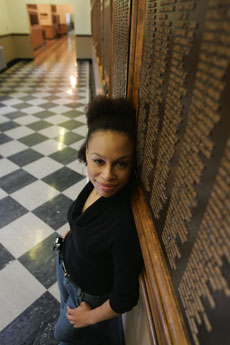Bronze Tablet honors first black since ’93

Online Poster
December 7, 2005
Two hundred and twenty names were added to the Bronze Tablet, which was placed in the University’s Library, this fall. Chakka Reeves, graduate student, was among the honorees, and one of only 15 black students to achieve Bronze Tablet status since 1990.
In order to achieve the Bronze Tablet honor, a University Honors student must have a grade point average of at least 3.5 and must be in the top three percent of his or her graduating class. The University has been honoring students this way since 1925.
“The fact that I’m African American makes (earning Bronze Tablet honor) more unexpected,” Reeves said.
Reeves works as a graduate counselor in the Office of Minority Student Affairs and said many minority students feel discouraged when they are the only person of color in a class, or when they don’t receive the same amount of attention from a teacher.
“When I work with students of color, it saddens me when they have internalized negative messages about their own abilities,” she said. “You can’t let their expectation of you become your own.”
Get The Daily Illini in your inbox!
The University claims to hold every student at the same level.
“I have every reason to believe the University has the same expectations for all of its students,” said Ruth Watkins, associate provost and professor at the University.
However, not everybody at the University feels that way.
“A lot of people don’t hold minority students to a high level,” said Angela Clark, assistant program director for the African American Cultural Program.
That does not mean that minority students are not successful at the University. There are many students who succeed, but just miss the Bronze Tablet by a grade or two, said Michael Jeffries, director of Minority Affairs.
“I don’t think (the few black students who have achieved Bronze Tablet status at the University) says very much because (minority students) have come very close, ” he said. “I think it’s wonderful to achieve the highest level, but I don’t think that should shadow the people who just fall short of perfection.”
Reeve’s, and other minority students on the tablet, accomplishments gives minority students a sense of pride, Clark said.
“It reestablishes the fact that (they) are entitled to be here,” she said. “Anyone can and does achieve here.”
But Reeves’ story goes far beyond being only one of four black students out of the 220 Bronze Tablet scholars that were added this fall.
With a grade point average of 2.8 in high school, Reeves said she got into the University “on an essay and a prayer.”
“I didn’t get any academic scholarships,” Reeves said. “Out of guilt for my mom, who had to pay my tuition, I decided I was going to be the best student I could be from now on.”
She recalls her freshman orientation, taking a tour of the library. Looking up and seeing the bronze tablets made her want to find out more about the honor, so she did some research to find out what it was all about.
“It was definitely planned,” Reeves said. “I said, ‘I want to do that.'”
It is important to set goals and to decide that you’re going to be committed, she said.
“It has a lot more to do with people just not knowing what it takes,” Reeves said.
“Many students don’t even know that there is a Bronze Tablet and how to achieve it,” said Nameka Bates, assistant director of the African American Cultural Program.
“If they knew those opportunities were available, they would try for those,” Clark said.
Reeves makes a point of letting her students know about their opportunities because she had to learn about the honors program, how to become a James Scholar and about the Bronze Tablet on her own.
Once she was in the honors program, she said, a lot of opportunities opened up. She became more aware of scholarships, internship opportunities and came in more contact with faculty, she said.
“Chakka is a very hard worker,” Bates said. “She is very determined.”
Reeves said a major misconception is that high achieving students do nothing but study or are more intelligent than other students.
“A lot of the reactions were, ‘I didn’t know you were a genius,'” Reeves said.
But, that stereotype just isn’t true, she said.
“I don’t fit into that mold,” Reeves said. “I don’t think I’m smarter than the average student.”
She also said students who want to achieve high academic goals “don’t have to sacrifice social interests.”
Reeves, who was involved in Women of Color and was a residential advisor, said there were times when she “would rather do something for (her) floor than homework.”
Jeffries described Reeves as very social, but also very focused.
“Her measurement is not just about her grades, but everything else she has done for the University,” he said.
Still, Reeves believes that many students see the Bronze Tablet as something that is only accomplished by the “really smart kids.”
“It’s one of those goals that students see as lofty,” Clark said. “I think more could be done on the part of the University to make sure students know that level is attainable.”
Reeves wants students to realize that the Bronze Tablet is attainable and should be seen as less intimidating.
“Whatever you want to accomplish, make your own expectations of yourself,” Reeves said. “Don’t accept other people’s expectations of you.”






